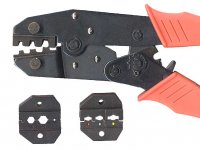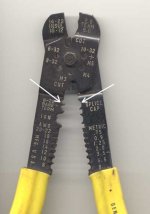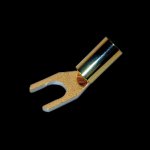It can still be crimped. It just requires some extra preparation in striping the wire. Same situation with the litz wire coils from Solen. I use a wire wheel and back the wire with a piece of wood.Peter Daniel said:Some wires just can't be crimped, like Cardas for instance, where each strand is enameled. Soldering is the only way😉
I consider myself a "visual learner", so if anyone has some pictures of their projects using crimps, it would be much appreciated! What is the most common - fastons? spade? ring? what about those hollow "cylinders"?
I always make a mess of the power supply, with wires running everywhere, and globs of solder on everything - I just need some pictures that show a nice clean and efficient way to wire the power supply (and also the wiring connecting the PS to the amp circuit)!
C'mon guys, show off those beautiful projects and your clean work! 🙂
I always make a mess of the power supply, with wires running everywhere, and globs of solder on everything - I just need some pictures that show a nice clean and efficient way to wire the power supply (and also the wiring connecting the PS to the amp circuit)!
C'mon guys, show off those beautiful projects and your clean work! 🙂
This is a crimping question relating to the Cardas Group buy - I bought the GRS-R9's and I am not sure what to do with them - crimp or solder.
Al,
if you solder get hot enought to melt, the insulation on your wires are going to fall off unless your using TEFLON. 🙂 Well one of these day I get some cheap crimpier from Jamesco.
Markp
As related to fiber, I was talking about manufacturing, and what they do. We normally many of these thing are left up to them.
As far as noise and performance goes, this would be an interesting to run. OF course, on Coax a crimp should be superior when at high frequencies.
if you solder get hot enought to melt, the insulation on your wires are going to fall off unless your using TEFLON. 🙂 Well one of these day I get some cheap crimpier from Jamesco.
Markp
As related to fiber, I was talking about manufacturing, and what they do. We normally many of these thing are left up to them.
As far as noise and performance goes, this would be an interesting to run. OF course, on Coax a crimp should be superior when at high frequencies.
Thanks for the replies guys.
As I use teflon insulated wire exclusively, to avoid molten insulation and the consequences thereoff, I guess the correct answer to derive from this is to both crimp and solder.
Cheers
Magura🙂
As I use teflon insulated wire exclusively, to avoid molten insulation and the consequences thereoff, I guess the correct answer to derive from this is to both crimp and solder.
Cheers
Magura🙂
Doing both defeats the purpose of crimping. Just crimp. When the joint is heated is expands and breaks the crimp contact and solder flows into the connection. You dont want that.Magura said:Thanks for the replies guys.
As I use teflon insulated wire exclusively, to avoid molten insulation and the consequences thereoff, I guess the correct answer to derive from this is to both crimp and solder.
Cheers
Magura🙂
Hmm, so the conclusion will be to go and buy a crimp tool.
Ive seen reasonably priced crimp tools here.
Magura🙂
Ive seen reasonably priced crimp tools here.
Magura🙂
Would this "heavy duty ratchet crimp tool" from Maplin electronics be worth the £20 it costs? The cheap ones I have from crimp terminal assortment sets are useless.
http://www.maplin.co.uk/products/module.asp?CartID=040415104113489&moduleno=4231&Products=1
http://www.maplin.co.uk/products/module.asp?CartID=040415104113489&moduleno=4231&Products=1
The problem is that there far more connector types and sizes than you usually have a crimp tool for. It's best to have and assortment of crimp tools (if possible) and use the one that best fits the connector. My all time favorite crimp tool, andthe one I have used the most is the plain universal crimp tool.Matttcattt said:Would this "heavy duty ratchet crimp tool" from Maplin electronics be worth the £20 it costs? The cheap ones I have from crimp terminal assortment sets are useless.
http://www.maplin.co.uk/products/module.asp?CartID=040415104113489&moduleno=4231&Products=1
Attachments
Do not use the above crimper! Only use a rachetting crimper made by Paladin, Canare, Greenlee, or one of similar style. Buy the 'dies' for the type of crimp you are making. Frames range from $40 to over $100 and dies are $30 or so. A good crimper will always make a crimp of proper tightness, not too tight or loose.
This is only true if the die is specifically made for the type and size connector you're using. The wrong die can actually give you a poorer crimp.markp said:A good crimper will always make a crimp of proper tightness, not too tight or loose.
What would be the recommended crimp tool for this spade connector?
Attachments
Why not use the Paladin 8000 CrimpAll? It's so much better than the 1300 and other cheap-o tools, and you can get the 8000 crimp frame for cheap here. I bought my paladin 8000 frame and a few die sets from them, and couldn't be happier. The elliptical lever mechanism delivers a lot more force toward the end of the stroke than you can get with a regular crimper. In combination with the long handles, this really reduces the strain on your hands, even for the toughest crimps. The ratcheting action makes sure you use the right amount of force too, so you get consistent results each time. I'd hesitate to spend $50+ on similar industrial crimpers for personal use, but at $22 (the price of a die set) I think you'll agree, this kind of tool pays for itself pretty quickly.
The 1360 die set cross references to 2095 die for the 8000 frame, also available from those guys.
The 1360 die set cross references to 2095 die for the 8000 frame, also available from those guys.
hifiZen said:Why not use the Paladin 8000 CrimpAll? It's so much better than the 1300 and other cheap-o tools, and you can get the 8000 crimp frame for cheap here. I bought my paladin 8000 frame and a few die sets from them, and couldn't be happier. The elliptical lever mechanism delivers a lot more force toward the end of the stroke than you can get with a regular crimper. In combination with the long handles, this really reduces the strain on your hands, even for the toughest crimps. The ratcheting action makes sure you use the right amount of force too, so you get consistent results each time. I'd hesitate to spend $50+ on similar industrial crimpers for personal use, but at $22 (the price of a die set) I think you'll agree, this kind of tool pays for itself pretty quickly.
The 1360 die set cross references to 2095 die for the 8000 frame, also available from those guys.
I suggested the PA-1360 because they were crying about price... There are better tools as you have pointed out.
Well, I guess that depends on what you're willing to pay for a good connection, and the bruises on the palm of your hands! 😉 Seriously though, I consider tools part of my project costs... the quality of tool used usually has a direct impact on the quality of the results. This is obvious, isn't it?. Now I'm as frugal as the next guy, but I see so many audio hobbyists who will spend silly sums of money on fancy capacitors, resistors, silver wire etc, but won't pony up for decent tools. This just doesn't make sense to me. 😕
Anyway, on to a slightly different topic:
Regarding the longevity of crimp and solder connections, I think a lot of it has to do with the corrosion resistance of the joint. The stripped end of a wire may allow gasses and moisture to get in beneath the insulating jacket and cause damage to the conductors in the area near the exposed connection, or possibly inside the crimp.
Does anyone apply a sealant of some sort after crimping / soldering to block out moisture and oxygen? I've seen clear nail polish recommended, and have thought of using candle wax myself. Ideally, you wouldn't want anything that will wick into the joint and cause problems itself - just a surface treatment to form an impermeable barrier. Any further ideas on this?
How about using a contact cleaner such as DeoxIt or ProGold before crimping? Do you think the fluid would interfere with the connection (cold weld) in any way, or cause deterioration over time.?
And what to do about flux which gets pulled up inside the wire by capillary action? I've seen some pretty nasty looking stuff just inside the insulation of a wire which has a perfectly nice looking solder joint at the end. Without removing the insulation, you don't see this crud, but I'm sure it can't be good for the long term performance of the connection.
Anyway, on to a slightly different topic:
Regarding the longevity of crimp and solder connections, I think a lot of it has to do with the corrosion resistance of the joint. The stripped end of a wire may allow gasses and moisture to get in beneath the insulating jacket and cause damage to the conductors in the area near the exposed connection, or possibly inside the crimp.
Does anyone apply a sealant of some sort after crimping / soldering to block out moisture and oxygen? I've seen clear nail polish recommended, and have thought of using candle wax myself. Ideally, you wouldn't want anything that will wick into the joint and cause problems itself - just a surface treatment to form an impermeable barrier. Any further ideas on this?
How about using a contact cleaner such as DeoxIt or ProGold before crimping? Do you think the fluid would interfere with the connection (cold weld) in any way, or cause deterioration over time.?
And what to do about flux which gets pulled up inside the wire by capillary action? I've seen some pretty nasty looking stuff just inside the insulation of a wire which has a perfectly nice looking solder joint at the end. Without removing the insulation, you don't see this crud, but I'm sure it can't be good for the long term performance of the connection.
Ok, I've broken down an order one of the Paladin 8000.
I use silver plated wire most of the time with gold terminals so I have always felt that some silver solder should not impair the connection or it's performance. Now, I am planning to do some performance testing to both crimped and solder connections. Noise and frequency performance will be the first tests.
Appling some lacquer over the crimp could not hurt. Lacquer is the same stuff in finger nail polish. Cleaning sure would not hurt either.
I use silver plated wire most of the time with gold terminals so I have always felt that some silver solder should not impair the connection or it's performance. Now, I am planning to do some performance testing to both crimped and solder connections. Noise and frequency performance will be the first tests.
Appling some lacquer over the crimp could not hurt. Lacquer is the same stuff in finger nail polish. Cleaning sure would not hurt either.
sounds interesting.
Perhaps you could spped up the ageing process by dipping the joint in saltwater.
Magura🙂
Perhaps you could spped up the ageing process by dipping the joint in saltwater.
Magura🙂
Sounds great, can't wait to see your results! 🙂jewilson said:Now, I am planning to do some performance testing to both crimped and solder connections. Noise and frequency performance will be the first tests.
- Status
- Not open for further replies.
- Home
- Design & Build
- Equipment & Tools
- Crimping VS. soldering


